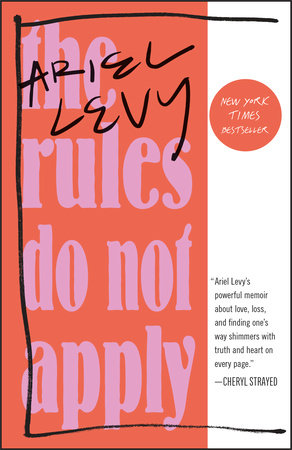The Rules Do Not Apply Reader’s Guide
By Ariel Levy


1. “Daring to think that the rules do not apply is the mark of a visionary,” Ariel believes. “It’s also a symptom of narcissism.” Do you agree with her? What are some examples you’ve witnessed of societal or personal progress enabled by someone ignoring or rewriting rules? How does this pertain to Ariel and her friends and family? When in this book—and in your own experience—has this kind of thinking been an enactment of selfishness or narcissism?
2. Can you relate to Ariel’s experience of having a “competent self” who runs the show? Why has she developed this alternate persona? What function does it serve? Has she depended on less than competent authority figures for protection or guidance? If so, when?
3. Why is Ariel so fascinated by Caster Semenya? Why is this trip so important to her? Are there similar turning points you recognize in your own life when you’ve proved yourself capable of things you weren’t convinced you could do? Or when, in retrospect, you’ve made “the first of many real mistakes that would stack up on top of one another until they blocked out the sun”? Are there particular life choices you’ve made that you wish you could undo?
4. What does Ariel mean when she warns that “the danger that we invite into our lives can come in the most unthreatening shape, the most pedestrian”? Has danger ever entered your world in this way? If so, when?
5. What do you make of Ariel’s family arrangement? What mistakes do you think her parents made? And, alternatively, in what ways do you think they were successful—for instance, how did they make her feel loved and valued? What did they do to facilitate her success as a writer?
6. What is so alluring to Ariel about Lucy? Why does she believe that “with this person, I could be normal, content, blessed”? Why is “Boy Scout Lady” such an apt nickname for her?
7. Both Lucy’s mother and Ariel’s are distressed by their daughters’ wedding—upset that it means their own values are being rejected. How would you describe each of their value systems? Which one is closest to your own? What do you make of Ariel’s mother’s insistence that “you never want to be dependent on a man”? Is this good advice? What are the benefits and disadvantages of this motto?
8. What does Ariel mean when she says, “Women of my generation were given the lavish gift of our own agency by feminism”? How do we see that playing out in the choices she makes, and in the choices you—or your mother or daughter—have made?
9. Is it significant that Ariel has an affair at exactly the moment when her friends start having children? Why does she do this? What is she trying to prove or accomplish or avoid? How might her life have been different if she had not done this?
10. How do you feel about Ariel’s decision to go to Mongolia when she’s pregnant? “If a doctor tells me there’s nothing wrong with doing something, then I consider the matter settled,” she writes. Do you agree? Later, Ariel feels that she “boarded a plane out of vanity and selfishness.” Do you think this is true? Why or why not?
11. If “grief is another world,” as Ariel writes, what are its distinguishing characteristics? How does grief change her? How has it changed you or your loved ones? What does it take from her and what does it give her?
12. What does Ariel learn from Al-Anon? Are there lessons she learns there that are meaningful to you, whether you have an addict in your life or not?
13. Why is Dr. John so important to Ariel? What role does he play in her recovery? They are from very different cultures—what do they have in common? What do you think will happen between them when she goes to South Africa? Which of her three fantasies seems the most plausible to you?
14. What does Ariel learn from her experience? How does it change her? What did you learn from it?
Just for joining you’ll get personalized recommendations on your dashboard daily and features only for members.
Find Out More Join Now Sign In